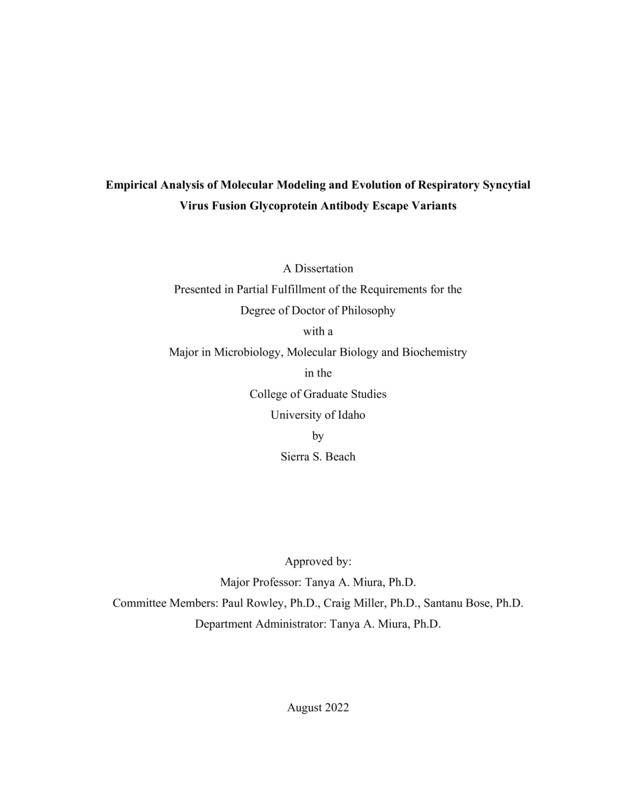Empirical Analysis of Molecular Modeling and Evolution of Respiratory Syncytial Virus Fusion Glycoprotein Antibody Escape Variants
Beach, Sierra Sachie. (2022-08). Empirical Analysis of Molecular Modeling and Evolution of Respiratory Syncytial Virus Fusion Glycoprotein Antibody Escape Variants. Theses and Dissertations Collection, University of Idaho Library Digital Collections. https://www.lib.uidaho.edu/digital/etd/items/beach_idaho_0089e_12448.html
- Title:
- Empirical Analysis of Molecular Modeling and Evolution of Respiratory Syncytial Virus Fusion Glycoprotein Antibody Escape Variants
- Author:
- Beach, Sierra Sachie
- Date:
- 2022-08
- Keywords:
- fusion glycoprotein molecular modeling monoclonal antibody escape respiratory syncytial virus
- Program:
- Biological Sciences
- Subject Category:
- Virology; Biochemistry; Biophysics
- Abstract:
-
Respiratory syncytial virus (RSV) is an important pathogen that causes severe lower respiratory infections in young infants, the immunocompromised, and the elderly. There are no vaccines or targeted anti-viral drugs for active RSV infection and only supportive care for hospitalized patients. The only approved treatment by the FDA is the prophylactic monoclonal antibody, palivizumab, given exclusively to high-risk infants during cold and flu season. The consequence of using monoclonal antibodies to prevent or treat viral infection is that it puts selective pressure on a specific epitope, which can result in a phenomenon called antibody escape. Current identification of antibody escape variants relies on patient samples or passage experiments. In this project, we aimed to use molecular modeling to identify antibody escape variants. We used molecular modeling to predict single mutations in RSV fusion glycoprotein (F protein) that would disrupt the binding of the palivizumab derivative, motavizumab, but not disrupt the folding of the F protein monomer. We accurately predicted eight F protein variants that propagated new virus. Six of our eight mutations were identified as monoclonal antibody resistant mutants (MARMs) that had reduced neutralization and binding by motavizumab. Surface plasmon resonance revealed a reduced on-rate for motavizumab for K272E, L258K, and S275H. We then examined the evolutionary pathway of RSV F protein using passage and fitness experiments to understand the likelihood and relevance of our predicted MARMs. We directed the evolution of RSV and derived a novel escape variant from passage experiments. This study empirically tested and validated the accuracy of our molecular modeling approach. We accurately predicted viral resistance to a monoclonal antibody and established a methodology that can be used to monitor the emergence of resistant viruses.
- Description:
- doctoral, Ph.D., Biological Sciences -- University of Idaho - College of Graduate Studies, 2022-08
- Major Professor:
- Miura, Tanya A
- Committee:
- Rowley, Paul A ; Miller, Craig A; Bose, Santanu
- Defense Date:
- 2022-08
- Identifier:
- Beach_idaho_0089E_12448
- Type:
- Text
- Format Original:
- Format:
- application/pdf
- Rights:
- In Copyright - Educational Use Permitted. For more information, please contact University of Idaho Library Special Collections and Archives Department at libspec@uidaho.edu.
- Standardized Rights:
- http://rightsstatements.org/vocab/InC-EDU/1.0/

